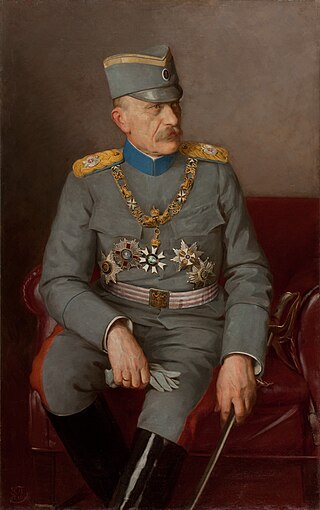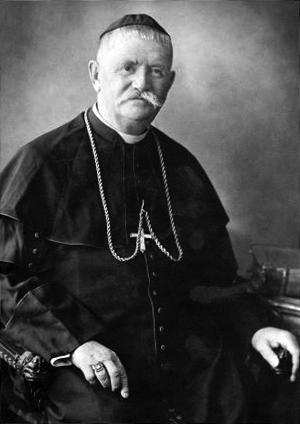Petar Mišić may refer to:
Petar Mišić may refer to:

Živojin Mišić was a field marshal who participated in all of Serbia's wars from 1876 to 1918. He directly commanded the First Serbian army in the Battle of Kolubara and in breach of the Thessaloniki Front was the Chief of the Supreme Command. He is the most decorated Serbian military officer in history.
The Serbian First Army was a Serbian field army that fought during World War I.

Svrljig is a town and municipality located in the Nišava District of the southern Serbia. According to 2022 census, the town has a population of 6,762 inhabitants, while the municipality has 10,781.

Petar Bojović was a Serbian and Yugoslav military commander who fought in the Serbo-Turkish War, the Serbo-Bulgarian War, the First Balkan War, the Second Balkan War, and World War I. He was briefly the Deputy Commander-in-Chief of the Yugoslav Royal Army in World War II, but played no real part in the conduct of the defence of Yugoslavia when it was invaded by the Axis powers in April 1941.

Božidar Janković was a Serbian army general commander of the Serbian Third Army during the First Balkan War between the Balkan League and the Ottoman Empire. In 1901 he served as Minister of the Army in the Ministry of Defence.

Istina is the sixth studio album released by Serbian and former Yugoslav rock band Riblja Čorba.

Alojzije Mišić was a Bosnian Croat Franciscan and prelate of the Catholic Church who served as the bishop of Mostar-Duvno and the apostolic administrator of Trebinje-Mrkan from 1912 until his death in 1942.

The Order of the Cross of Takovo was a Serbian state order.
Franciscan Province of Herzegovina of the Ascension of the Blessed Virgin Mary is a province of the Catholic religious order of the Order of Friars Minor, commonly known as Franciscans. It was established in 1843 when it seceded from the Franciscan Province of Bosna Srebrena. Its headquarters are in Mostar.
Josip Mišić is a Croatian professional footballer who plays as a defensive midfielder for Dinamo Zagreb.
Josip Mišić may refer to:
Mišić is a Serbian, Bosnian, and Croatian surname, derived from the male given name Mišo, or from the singular meaning "small mouse" and "muscle". It may refer to:
Petar Mišić is a Croatian professional footballer who plays as a left midfielder for Bosnian Premier League club Zrinjski Mostar.
Sasa Misic may refer to:
The Batković camp was a prison camp operated between 1992 and 1996 by Republika Srpska authorities in Batković, a village in the municipality of Bijeljina, Bosnia and Herzegovina during the Bosnian War. It is believed to have been the first concentration camp of the Bosnian war, set up for Bosniak (Muslim) and Croat men, women and children, in an effort to ethnically cleanse the areas under Bosnian Serb control. Detainees were held in two large barns and tortured, deprived of food and water, forced to dig trenches, carry ammunition to the front lines, work in fields and factories and bury the dead. Prisoners were subject to daily beatings, sexual assault and forced to beat one another.

Petar Čule was a prelate of the Catholic Church who served as the bishop of Mostar-Duvno and of apostolic administrator of Trebinje-Mrkan from 1942 until his retirement in 1980. After his retirement, he was named titular archbishop of Giufi in present-day Tunisia. Serving as bishop during World War II, Čule was an opponent of the Ustaše regime in the Independent State of Croatia, helping to save the persecuted Serbs and political dissidents. Imprisoned under false accusations by the communists in 1948 and released only in 1955, he was also a political victim of communist political persecution.
Herzegovina Affair or Herzegovina Case refers to a conflict between the Franciscan Province of Herzegovina and the Diocese of Mostar-Duvno over the redistribution of parishes in the said diocese. The conflict between the Franciscans and the diocesan clergy started with the restoration of the regular church hierarchy in Bosnia and Herzegovina after its occupation by Austria-Hungary in 1881. The Herzegovina Case presents a problem in the relationship between the Herzegovinian clergy as well as the Catholic faithful.
The armistice of Belgrade was an agreement on the termination of World War I hostilities between the Triple Entente and the Kingdom of Hungary concluded in Belgrade on 13 November 1918. It was largely negotiated by General Louis Franchet d'Espèrey, as the commanding officer of the Allied Army of the Orient, and Hungarian Prime Minister Mihály Károlyi, on 7 November. It was signed by General Paul Prosper Henrys and vojvoda Živojin Mišić, as representatives of the Allies, and by the former Hungarian Minister of War, Béla Linder.

Petar Mišić was a Serbian and Yugoslav general. He is one of the several main leaders of the May Coup, in which King Aleksandar Obrenović was killed in 1903. After he retired in 1906 at the request of the English, he entered politics. He was a prominent opponent of the Black Hand and the president of the court panel at the Salonica trial in 1917.